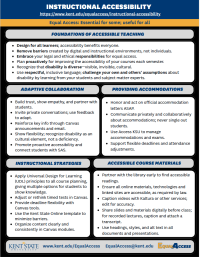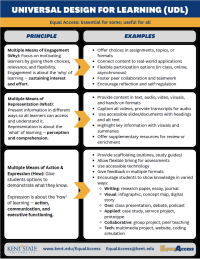
Instructional Accessibility
Instructional Accessibility ensures all students can participate and succeed by reducing barriers in teaching and course design. Using inclusive communication, proactive planning, and Universal Design for Learning (UDL), instructors provide multiple ways for students to engage, access materials, and show knowledge. This approach reduces compliance risk, fosters equity, and strengthens learning for the entire classroom community.
Universal Design for Learning
Universal Design for Learning (UDL) is a proactive approach: design courses from the start to be flexible, accessible, and inclusive so that all students can engage, learn, and demonstrate knowledge effectively. UDL is a framework for designing instruction that anticipates learner diversity. It focuses on removing barriers rather than retrofitting accommodations and benefits all students, not just those with disabilities. UDL is grounded in neuroscience, emphasizing three core areas: engagement, representation, and action/expression.
Specific Guidance for Faculty on Providing Accommodations
Kent State University is committed to ensuring equal access for students with disabilities. Student Accessibility Services (SAS) is one of the primary resources that helps to fulfill this commitment. By collaborating closely with faculty, together we provide the necessary accommodations and resources to support students throughout their academic journey. For more information on working with students with disabilities and the benefits of making your class accessible for all, please study the comprehensive guide at Accessibility for Faculty on SAS' website.
Approved Accessibility Animals on Campus
Your guide to paws, purpose, and policy.
We love animals—and we know many of you do, too. Whether they’re guiding, comforting, alerting, or just being their fuzzy, fantastic selves, approved accessibility animals play a vital role in campus life. Learn about the types of animals allowed at Kent State, who approves them, and how to keep things running smoothly for animals and humans alike at the Animals on Campus webpage.
Campus Partners
Student Accessibility Services (SAS)
Academic, housing, and transportation accommodations for students.
Phone: 330-672-3391 | Email: sas@kent.edu
Web: https://www.kent.edu/sas
Kent State Online
Support for creating and delivering accessible course content through Canvas.
Email: online@kent.edu
Web: https://www.kent.edu/kso
Center for Teaching & Learning (CTL)
Training and support for inclusive, accessible instruction and course design.
Phone: 330-672-2992 | Email: ctl@kent.edu
Web: https://www.kent.edu/ctl
Digital Accessibility Team
Support for testing and editing technology and content for better accessibility.
Email: equalaccess@kent.edu
Web: https://www.kent.edu/digitalaccessibility



